Parents in one of Pakistan's most troubled provinces are to be paid to vaccinate their children against polio, the crippling disease the world is tantalisingly close to eradicating.
It is hoped some 2 million children from some of the most disadvantaged areas of Khyber Pakhtunkhwa (KP), the north-western province wracked by Taliban violence, will benefit from the scheme.
Parents will be entitled to claim 1,000 rupees (almost £6) for each newborn child who completes a 15-month programme of vaccinations that will protect them against a number of diseases including measles, hepatitis and polio.
It is the first time the country has resorted to monetary incentives, which are rarely used around the world.
Public health officials battling childhood diseases face immense challenges in KP, where militant attacks are a daily routine, poverty is entrenched and many people are deeply suspicious of programmes enthusiastically backed by western powers.
"It has to be a good amount of money to be attractive, even in the very poorest districts of the province," said Janbaz Afridi, deputy director of the province's expanded programme on immunisation. "If it is a success we will extend it to every child in the province."
KP's government, backed by UN agencies, is currently on a war footing against polio in particular because Peshawar, the province's teeming capital, has become a global health problem.
The historic frontier city is one of the last remaining redoubts of polio, the virus that cripples and kills children and which has been eradicated in every country except Pakistan, Afghanistan and Nigeria.
Cases from around the world, including China and Syria, have been genetically matched to the Peshawar strain.
Last month the World Health Organisation declared the city the "largest reservoir of endemic poliovirus in the world", a problem caused in part by the city's open sewage channels and broken water pipes. Polio is spread through contact with human faeces.
Within the neighbouring tribal areas, Peshawar acts as a central exchange and an "amplifier" for a disease carried in and out of the city by the tens of thousands of people who pass through every day, including a huge population of refugees who fled Afghanistan in the 1980s.
"The problem with Peshawar is that we always have cases there," said Bilal Ahmed, a senior Unicef official in the city. "In other districts the virus comes and goes, but it never leaves Peshawar, which tells us it's the source."
The WHO says more than 90% of cases around the country and in neighbouring Afghanistan are genetically linked to the city.
Of the world's three polio-endemic countries, Pakistan is the only one where the situation is getting worse and cases are increasing.
India, which this year gained its hard-earned status as polio-free, now turns away travellers from Pakistan unless they have a certificate proving they have been vaccinated. Other countries could follow suit.
The latest push in Peshawar is an attempt to give polio vaccine drops to almost every child under the age of five every weekend for three months.
It requires 8,000 health workers to hit the streets with the aim of vaccinating nearly 800,000 children in a single day.
Four thousand police officers will escort them to protect them against the gunmen who have killed scores of polio vaccinators around the country in recent years.
During vaccination sessions, entire neighbourhoods are put into lockdown, with motorbikes banned from the streets.
One threat is from the Taliban, who have used the global campaign to eradicate polio as a chip in their fight against the US.
In 2012 insurgent commanders in the restive tribal areas of North and South Waziristan banned polio teams from their territories in what they said was retaliation for US drone strikes. Some religious clerics argue the drops are part of a foreign plot against the Islamic world to make Muslim children infertile – a perception arguably made worse by international interest in the issue.
It's a major problem for a campaign officials say needs to reach 97% of children to stand a chance of eradicating the disease in the city.
Polio teams carry booklets of "fatwas", or religious decrees, by famous scholars who argue there is nothing wrong with the drops.
The government has also called on high-profile clerics to support the programme.
"In public the mullahs are all on the same page now," said one health official. "Many still don't like it but they don't preach openly against vaccination anymore."
Some vaccinators say that while fewer parents are refusing the drops for their children, many hide them indoors on vaccination days.
Public antipathy is still easy to find. Amir Zaada, a father visiting the city with his three children from a distant part of the province, said the vaccination programme was "just a game".
"There are other fatal diseases, so why is the government only talking about this," he asked, also raising the case of Shakil Afridi, a doctor who ran a hepatitis vaccination campaign in the town of Abbottabad.
The programme's motivation was not public health but an elaborate scheme by the CIA to discover whether Osama bin Laden was hiding in the town. His unmasking confirmed the worst suspicions of those inclined to see vaccinators as a western conspiracy.
Zaada said he had no regrets not vaccinating his children.
He said: "Look at them. They are fine and in good health. Only God keeps them safe and healthy."
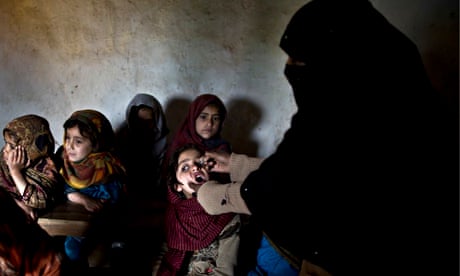

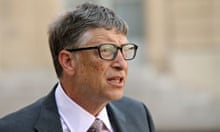
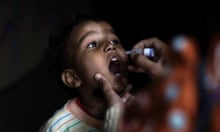

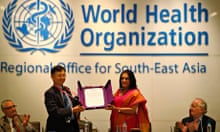
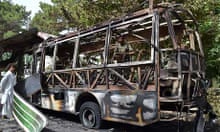
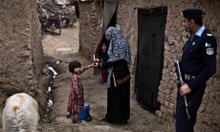
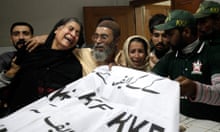
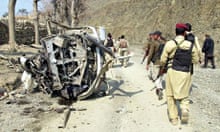
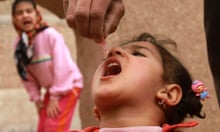
Comments (…)
Sign in or create your Guardian account to join the discussion